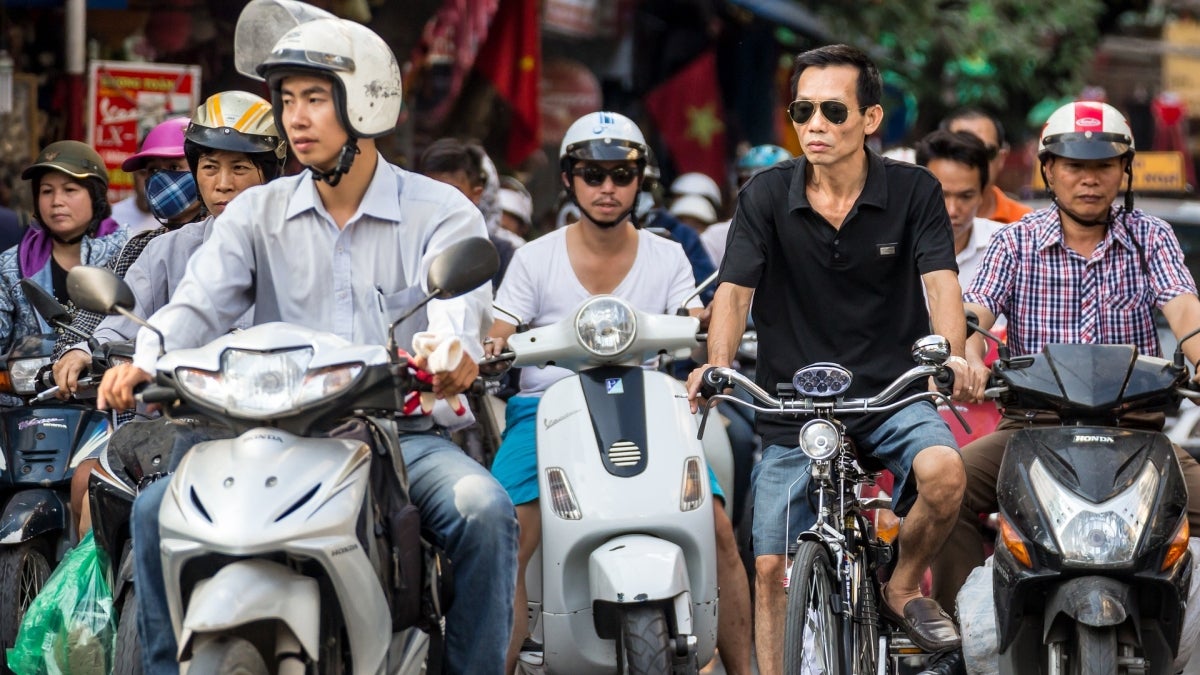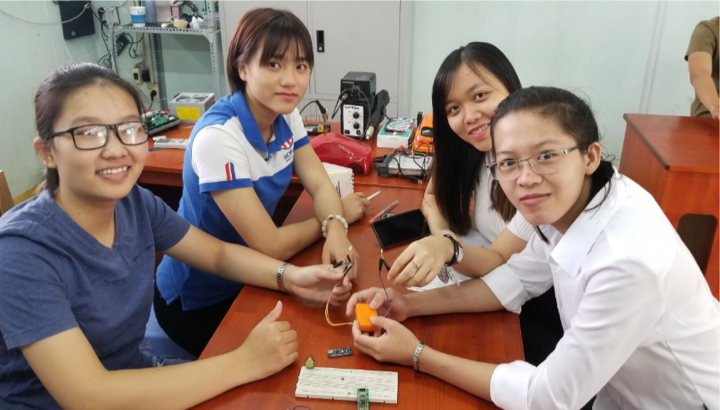A car collided with an ambulance on the busy streets of Ho Chi Minh City, Vietnam. Despite the blaring sirens, the driver hadn’t heard the frantic ambulance approaching because the windows were up and the music was playing loudly.
Hoàng My, a fourth-year automotive engineering student at Ho Chi Minh City University of Technology and Education, witnessed this collision on her way to class. In a country with tens of millions of motorbike drivers, My worried for the roughly 2.5 million deaf Vietnamese people who drive motorbikes every day.
Most deaf people don’t wear hearing aid devices while driving and, since they can’t get an official driver’s license, they also drive unprotected by any accident insurance.
My was determined to do something to protect these vulnerable drivers.
Both jarred and inspired by the collision, My joined the USAID-sponsored Engineering Projects in Community Service Program — known by the students as EPICS. EPICS is an engineering design challenge that asks university students to identify an engineering-based community issue, form a team of students to tackle that issue, and create a working prototype of a solution.
Arizona State University, as an implementing partner of the USAID BUILD-IT Alliance, supports the EPICS program in six Vietnamese engineering universities. Since 2017, ASU faculty and staff have traveled to Vietnam regularly to conduct a number of EPICS curriculum trainings to prepare Vietnamese faculty to run the EPICS course on their campuses. ASU encourages EPICS in Vietnam as a means to empower young innovators to engineer better communities.
Starting in September 2018, My formed the Wonder Girls, an EPICS team with three other female engineering students. The Wonder Girls set out to engineer a safety device for deaf motorbike drivers.
To understand a deaf person’s challenges, My and her teammates, Minh Hoà, Hoàng Hà, and My Hông, visited a school for the deaf. They learned how the deaf and hearing-impaired use signals, touch rhythms and signs to communicate. The deaf students shared their driving challenges with the Wonder Girls through writing and sign language. The students learned that driving is especially dangerous for the hard of hearing, but thet are compelled to drive to earn a living. Although expensive hearing aid devices can help the hearing-impaired drive more safely, there are few innovations for the entirely deaf.
From left: Hoàng My, Minh Hoà, Hoàng Hà and My Hông.
With guidance from the deaf community, the Wonder Girls spent the next four months designing, re-designing, 3D printing and coding a signal and vibration gadget prototype. While the Wonder Girls’ regular classes had prepared them to do the technical work needed for their prototype, no class had ever asked them to apply their learning by leading their own innovation.
My saw EPICS as a chance to “actualize our idea and turn society into a better place with it.” The EPICS faculty at her school encouraged the Wonder Girls to reach beyond their comfort zone to code, weld electronic circuits and 3D print their prototype at the nearest USAID-supported Maker Innovation Space.
“Before EPICS I only learned basic programing,” shared Wonder Girls’ team tech guru, My Hông. “But now I can program a whole complicated device. We never designed and printed a 3D prototype before, but now we’ve taught ourselves how.”
In preparation for the EPICS Final Showcase in January 2019, the Wonder Girls demonstrated their prototype, Abu-Friend, to industry mentors from Dow Vietnam. Onlookers were impressed to see that a small orange box containing just a microphone sensor, a wi-fi transmitter and a vibration motor can give a lifesaving signal to a deaf driver.
The Wonder Girls explained that the Abu-Friend gadget is worn close to a driver’s chest and vibrates when it hears an ambulance siren. Feeling the vibration, the driver can follow traffic rules to gradually pull over to let the ambulance pass safely. The Abu-Friend impacts a specific problem for a specific vulnerable population and does so at about the U.S. equivalent of $20.
The Wonder Girls are still working on the kinks in the system. As first-time innovators, designers, coders and builders, they acknowledge there is still room to grow as engineers and entrepreneurs.
Now that EPICS is complete, the Wonder Girls will continue developing Abu-Friend with the USAID-supported Maker-to-Entrepreneur Program so they can bring Abu-Friend to market.
Reflecting on the EPICS Hoàng Hà said, “As a team player, step-by-step EPICS made me better. I’m no longer embarrassed to say my opinion, right or wrong. We respect each other’s views.”
Written by Deren Temel, program manager, ASU Vietnam.
Top photo by Pixabay
More Science and technology

Pioneering professor of cultural evolution pens essays for leading academic journals
When Robert Boyd wrote his 1985 book “Culture and the Evolutionary Process,” cultural evolution was not considered a true scientific topic. But over the past half-century, human culture and cultural…

Lucy's lasting legacy: Donald Johanson reflects on the discovery of a lifetime
Fifty years ago, in the dusty hills of Hadar, Ethiopia, a young paleoanthropologist, Donald Johanson, discovered what would become one of the most famous fossil skeletons of our lifetime — the 3.2…

ASU and Deca Technologies selected to lead $100M SHIELD USA project to strengthen U.S. semiconductor packaging capabilities
The National Institute of Standards and Technology — part of the U.S. Department of Commerce — announced today that it plans to award as much as $100 million to Arizona State University and Deca…

